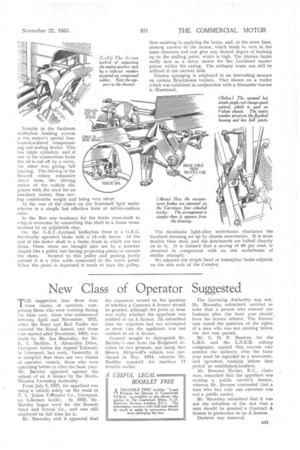New Class of Operator Suggested
Page 41

If you've noticed an error in this article please click here to report it so we can fix it.
THE suggestion that there were three classes of operator, comprising those who were working during the basic year, those who commenced between April and November, 1933, w hen the Road and Rail Traffic Act received the Royal Assent, and those who started after November, 1933, was made by Mr. Ian Macaulay, for Mr. E. C. Barkley, 1, Alexandra Drive, Liverpool, before the Appeal Tribunal, in Liverpool, last week. Generally, it is accepted that there are two classes of operator, namely, those who were operating before or after the basic year. Mr. Barkley appealed against the refusal of an A licence by the NorthWestern Licensing Authority.
From July 3, 1933, the appellant was using a vehicle solely on the work of T. L. 'James Trtnsport Co., Liverpool, an A-licence holder. In 1935, Mr. Barkley began workfor the Rossett Sand and Gravel Co., and was still employed on full time for it.
Mr. Macaulay said it appeared that the argument turned on the question of whether a Contract A licence should be granted, although the point at issue was really whether the appellant was entitled to an A licence. He submitted that the objectors had not attempted to show that the applicant was not entitled to an A licence.
Counsel sought to distinguish Mr. Barkley's case from the Ridgewell decision on two grounds, one being that Messrs. Ridgewell's vehicle was purchased in May, 1934, whereas Mr. Barkley acquired his machine 11 months earlier.
The Licensing Authority was not, Mr. Macaulay submitted, entitled to infer that a person who entered the business alter the basic year should. have his licence refused. The Roston case raised the question of the rights of a man who was not running before the Act was passed.
Mr. G. H. P. Beanies, for the L.M.S. and the L.N.E.R. railway companies, argued that anyone who entered the industry after the basic year must be regarded as a newcomer, and operators working before that period as established4hatiliers.
Mr. Rowand Harker, K.C., chairman, remarked that the appellant was seeking a public carrier's licence, _whereas Mr. Bearnes contended that a man who had only one customer was not a public carrier.
Mr. Macaulay submitted that it was not the intention of the Act that a man should be granted a Contract A licence in preference to an A licence.
Decision was reserved.




















































































